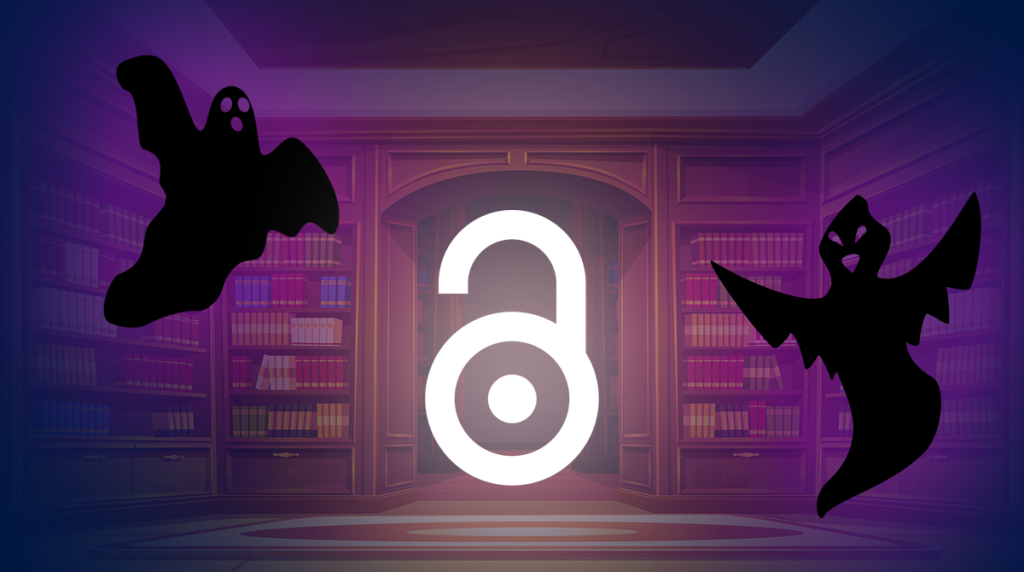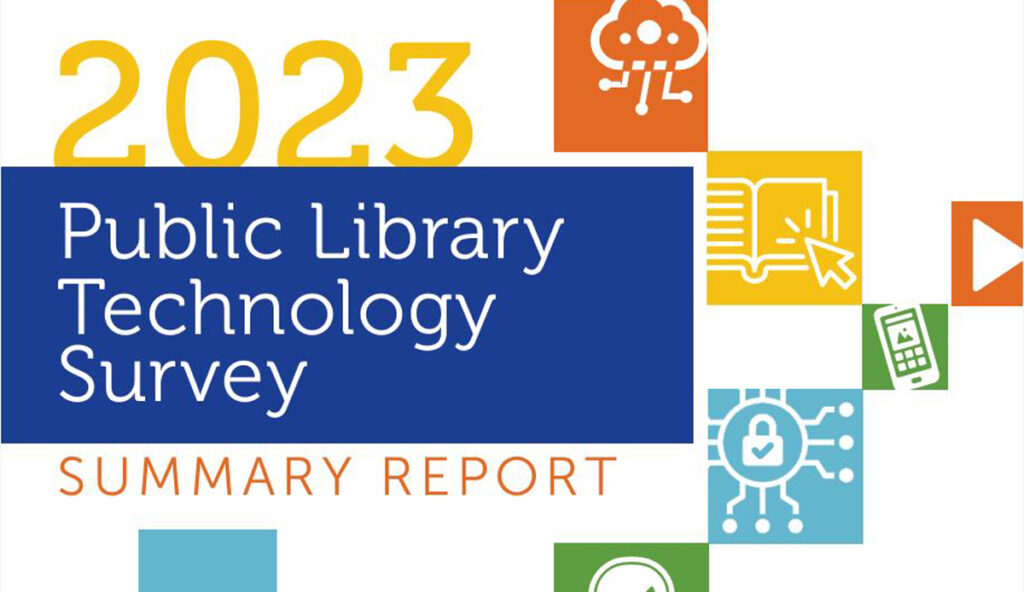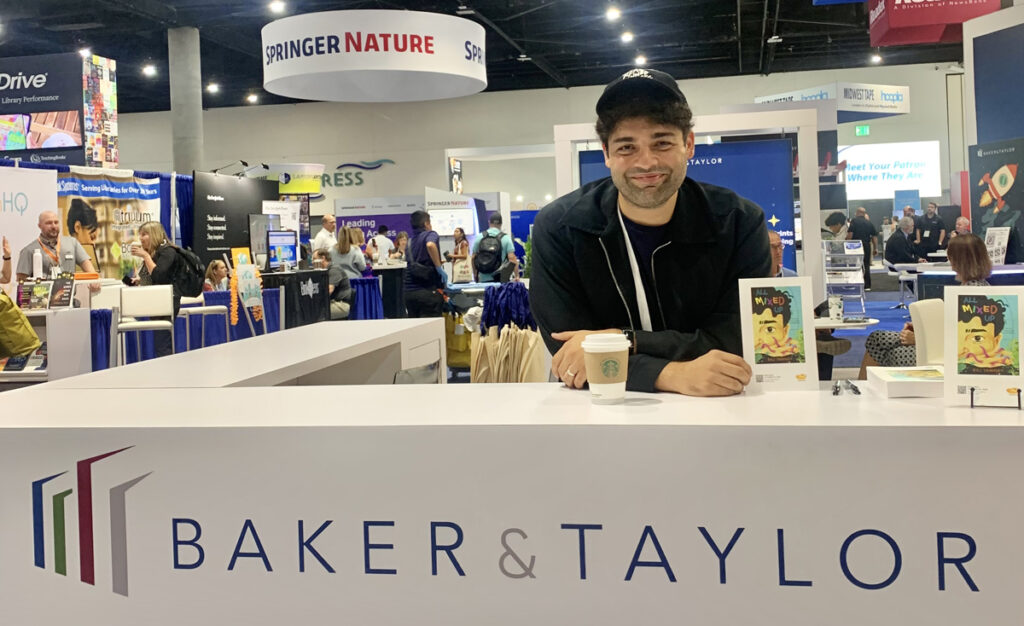I Love Libraries is kicking off Open Access Week, celebrated October 23-29, with a spooky guest post from Josh Bolick, Maria Bonn, and Will Cross, editors of Scholarly Communication Librarianship and Open Knowledge (ACRL, 2023). Read on if you dare!
As anybody who has seen Ghostbusters (everybody, right?) knows, libraries can seem like spooky places. Library users wandering the stacks might fear what lurks behind closed doors or down a dimly lit corridor. But what they find hidden in dark library spaces probably isn't any scarier than a Stephen King novel. The really scary stuff isn’t what’s in the library, it’s the walls that keep people locked out, leaving them vulnerable to the specter of misinformation.
 Are dark forces holding diabolical seasonal rites? Are extraterrestrial beings walking among us? Is someone giving out THC-laced candies for Halloween? Probably not. Are large corporations locking away public knowledge and harvesting vast amounts of personal data for their own gain? Spoiler alert: Yes, and it’s scarier than any Eldritch monster.
Are dark forces holding diabolical seasonal rites? Are extraterrestrial beings walking among us? Is someone giving out THC-laced candies for Halloween? Probably not. Are large corporations locking away public knowledge and harvesting vast amounts of personal data for their own gain? Spoiler alert: Yes, and it’s scarier than any Eldritch monster.
Within the walls of the library, or more often now, behind the authentication screen, is expertly researched and peer-reviewed scholarly literature that can help anyone make important decisions about their health or habits or inform their understanding of complex social problems. Unless you have a university login, however, you may not be able to access that scholarship or use it to improve your personal and professional life. Even those fortunate enough to have institutional access can’t get everything, not even at the richest universities.
Academic publishing is estimated to be a more than $25 billion dollar per year business, with a small number of companies—some publicly traded—generating substantial revenue by locking up a significant share of the market. Academic researchers have a long history of authoring articles, contributing to peer review, and providing editorial support for free to advance our society’s knowledge. Unfortunately, too many scholarly publishers lock that work behind a paywall and sell it to libraries and readers at extractive (dare we say “vampiric”?) rates for Stay Puft Marshmallow Man-sized profits. It’s a pretty spooky situation.
As a result, while high quality information is locked behind paywalls, there’s plenty of access to poor information ready to fill the void. Misinformation, disinformation, and outright propaganda haunt the internet today, affecting our ability to improve public health, address climate change, and maintain a stable democracy. For people in every community, that can mean the difference between finding the right information to understand a medical emergency and getting lost in a sea of dubious home remedies. For society, that can mean COVID denial and election misinformation run rampant. Systems of peer review and expert information can illuminate a safe path, but only if the public has access.
Unfortunately, there isn’t a trap that we can use to capture and safely sequester the misinformation that haunts us. What we can do, though, is expose it to more truth and knowledge. It’s not a silver bullet, but it might force bad information shrieking back into the internet sewers. Librarians are working towards that every day by supporting and advancing open access to scholarly knowledge. We’re also advocating for open science initiatives, open data sharing to enable verification and reproducibility of research, and open educational resources to support broader access to learning materials—including our own open textbook on open knowledge and librarianship (free download).
 This is Open Access Week, an annual opportunity to highlight the benefits of open access (OA). OA refers to scholarly literature that is digital, online, free of charge, and free of most copyright and reuse restrictions (Suber). The benefits of OA are well-documented and many funders have begun to require open (or at least public) access.
This is Open Access Week, an annual opportunity to highlight the benefits of open access (OA). OA refers to scholarly literature that is digital, online, free of charge, and free of most copyright and reuse restrictions (Suber). The benefits of OA are well-documented and many funders have begun to require open (or at least public) access.
Access to information is a fundamental value for libraries, and librarians have been advocating for OA for years while fighting information zombies that feed off of scholarship. That’s a great reason to love libraries, even if the stacks can seem a bit foreboding on a chilly October night.
Josh Bolick is head of the David Shulenburger Office of Scholarly Communication and Copyright at University of Kansas; Maria Bonn is an associate professor and director of the MS in Library and Information Science program in the School of Information Sciences at the University of Illinois Urbana Champaign; and Will Cross is director of the Open Knowledge Center and head of Information Policy at North Carolina State University. They are the editors of Scholarly Communication Librarianship and Open Knowledge (ACRL, 2023).



